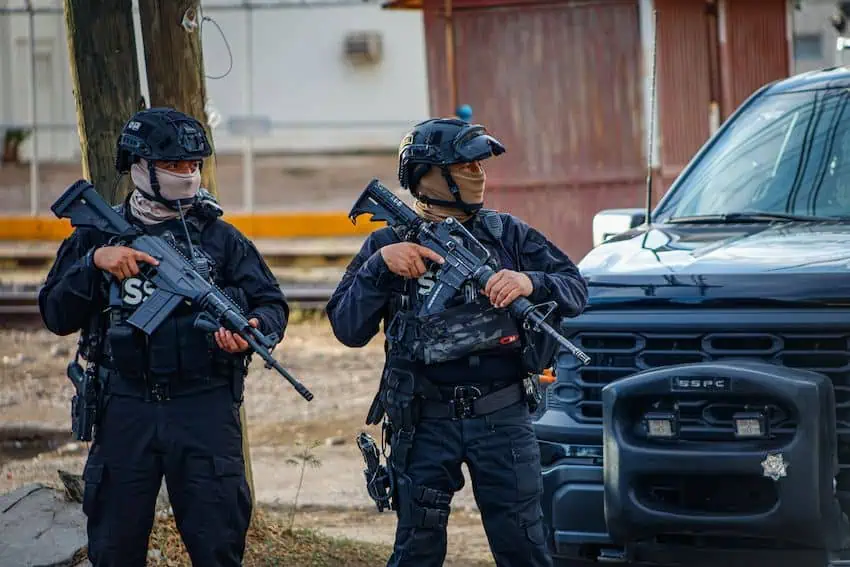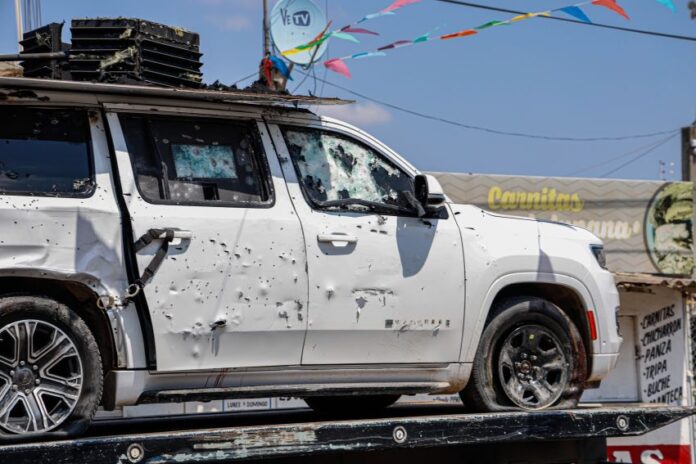Authorities in the violence-plagued northern state of Sinaloa reported on Monday the discovery of 20 bodies in Culiacán, five of which were decapitated.
Four decapitated bodies were found hanging from a bridge above Federal Highway 15, according to the Sinaloa Attorney General’s Office (FGE).
🚨 En #Sinaloa continúa la #violencia… de terror!
Hallaron 20 cuerpos en #Culiacán, 4 colgados, y 16 en una camioneta. A un año de la disputa entre cárteles, la violencia se agudiza. pic.twitter.com/B1Fb4Gt2MX— Eunice Rendón (@EuniceRendon) July 1, 2025
Sixteen other bodies, one of which was decapitated, were found in a van left on the side of the highway beneath the bridge.
The FGE said that a bag containing five heads was found at the scene. It said that all the victims were men and had gunshot wounds on their bodies.
The bodies were found late on Sunday night north of central Culiacán, the capital of Sinaloa and an epicenter of cartel violence. None of the victims had been identified by late Monday.
The grisly discovery came almost one year after alleged Sinaloa Cartel leader Ismael “El Mayo” Zambada García was arrested in the United States after he was allegedly kidnapped and forced onto a private plane by Joaquín Guzmán López, a son of imprisoned drug lord Joaquín “El Chapo” Guzmán Loera.
The alleged kidnapping and arrest of Zambada triggered an escalation in a long-running dispute between the “Los Chapitos” and “Los Mayos” factions of the Sinaloa Cartel. The battle between the rival groups has claimed well over 1,000 lives since September 2024. More than 1,000 people have disappeared in Sinaloa in the same period.
Narco-message was left with the bodies
A narcomanta (narco banner) was left inside or on the Ford Transit Van in which 16 bodies were found, according to media reports.
The Reforma newspaper reported that the message on the banner was directed to “the sons of Joaquín ‘El Chapo’ Guzmán, specifically … Iván Archivaldo, leader of the debilitated ‘Los Chapos’ group.”
Casi 300 días de violencia en #Culiacán y lo de esta mañana supera la ficción:
20 sujetos fueron encontrados asesinados: cuatro colgados de un puente carretero en la salida norte y otros 16 cuerpos al interior de una vagoneta.
Miles de refuerzos federales ¿Y? nada cambia. pic.twitter.com/GRB4DogyjC
— Juan Pablo Pérez-Díaz (@perezdiazmx) June 30, 2025
According to Reforma, the message said:
“Start fighting, stop hiding, stealing, and screwing over the people. … This is what will happen to the entire bunch of delusional ones who go along with the ‘Chapozetas’. We’ll be waiting for you here — welcome to the new Sinaloa, without extortion and fighting against scum. Sincerely, The People of Sinaloa.”
The massacre of 20 people is the deadliest single episode of violence of what has widely been described as a “war” between “Los Chapitos” and “Los Mayos.”
Citing four sources, The New York Times reported on Monday that amid the turmoil “Los Chapitos” have entered into an alliance with “an old and powerful adversary, the Jalisco New Generation Cartel,” or CJNG.
“The risky move by El Chapo’s sons could ultimately turn the Jalisco cartel into the world’s biggest drug trafficker — a shift that could potentially redraw alliances and power structures across international drug markets, analysts say,” the Times reported.
The CJNG and the Sinaloa Cartel are among six Mexican cartels designated as foreign terrorist organizations by the United States government earlier this year.
Sinaloa government: ‘Military and police forces are working together to reestablish total peace’
Feliciano Castro Meléndrez, general secretary of the Sinaloa government, said that the murders of the 20 people whose bodies were found in Culiacán “is part of the the violence and insecurity” plaguing Sinaloa.
“[It’s a] regrettable situation, all deaths are regrettable, even more so when they are deaths imposed by violence,” he said.
Castro said that the Sinaloa government, led by Governor Rubén Rocha Moya, “in coordination” with the federal government, is committed to “implementing the measures necessary to continue making progress in the fight against this situation of violence and security.”
The “military and police forces are working together to reestablish total peace in Sinaloa,” he said.

Almost 10,000 members of federal security forces, including the army and the National Guard, have been deployed to the state, but have been unable to quell the violence to any significant extent.
Castro said that “every occurrence” of violence obliges authorities to “review the process of the [security] strategy,” adding that it was especially incumbent on them to do so after “events of the magnitude such as that we have just recorded.”
He asserted that “very significant results” have been achieved in the fight against violence in Sinaloa, and noted that in early July the state government will present “a complete report” on the security situation based on the events of the first six months of the year.
The task authorities face is a monumental one. Sinaloa was the fifth most violent state in Mexico in the first five months of the year in terms of total homicides with 686, according to federal data. Murders in the northern state increased by 244% compared to the 199 recorded in the first five months of 2024.
In Culiacán, “intense fighting between the heavily armed” rival factions of the Sinaloa Cartel “has become the new normal” since the escalation of their dispute last year, according to the Associated Press.
The news agency reported that “dead bodies appear scattered across Culiacán on a daily basis, homes are riddled with bullets, businesses shutter and schools regularly close down during waves of violence.”
“Masked young men on motorcycles watch over the main avenues of the city,” AP added.
In addition to the discovery of the 20 bodies on Federal Highway 15 late Sunday, there were numerous other murders in Culiacán and other parts of Sinaloa in recent days. The news website La Silla Rota reported that there were a total of 45 murders across six Sinaloa municipalities in the four days between last Friday and Monday.
With reports from EFE, AFP, Reforma, El País, AP and Noroeste
